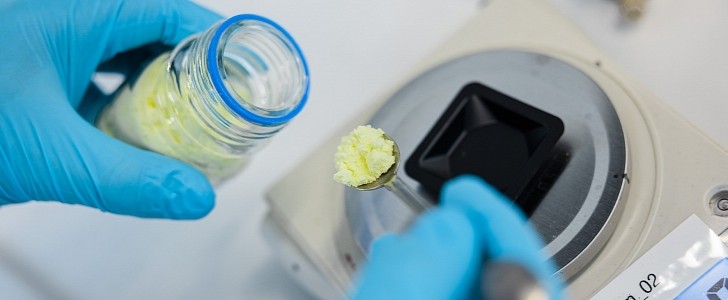Lithium-sulfur cells are as much a promise as solid-state batteries. Thanks to sulfur properties, they could offer three times more energy density than current ternary cells at a fraction of the cost if they could resist more than a few cycles. The battery startup Theion is confident that it solved these issues and will soon sell Li-S batteries.
The company announced that it would soon start to ship samples of its Unique Crystal battery to aerospace companies to validate the idea, composed of sulfur crystals, carbon nanotubes, and a proprietary solid electrolyte. Ironically, this last item also makes it a solid-state battery. The lithium metal anode Theion decided to use just reinforces that and makes the battery even lighter. The company said it is open to studying other anodes.
Li-S cells have never worked very well due to an effect called polysulfide “shuttle.” Due to the liquid electrolyte used by cells, the sulfur would get diluted and form polysulfides both in the anode and in the cathode. That kills active material in the battery and makes these cells last only a few charging cycles.
With sulfur crystals and the solid electrolyte, Theion said it could achieve more than 1,000 cycles at 1C, which means it can be completely charged in one hour. The carbon nanotubes help increase conductivity. The startup expects its production cells to offer 1,000 Wh/kg. That’s 3.85 times what the best current ternary lithium-ion cells provide, at 260 Wh/kg.
In other words, an EV with such batteries could weigh just 26% of what existing cell packs do. Just imagine what getting rid of 74% of mass could do to EV efficiency. With the same amount of energy contained by the battery packs we have today, they could travel a lot further than present EVs can.
Using sulfur has other advantages. As an abundant material that does not require mining – it is an industrial byproduct – it will make batteries a lot cheaper. The production method developed by Theion allegedly saves 90% of energy, which means that carbon emissions are also a lot lower than those on current battery manufacturing sites.
Like all good news, Theion still has to prove these cells are mature enough to reach mass production. When they are, they should be sold used in aircraft, drones, mobile phones, and laptops before they get to electric flight and EVs. Theion has the financial backup of Team Global, a technology holding company that also invested in Volocopter, Zapata, and Auto Flight, which shows the aerospace ventures that can use these cells in the first place.
Putting them in airplanes and automobiles will be a more demanding task. Despite that, Theion is confident that it can start supplying automakers with its solid-state Li-S cells by 2024.
Li-S cells have never worked very well due to an effect called polysulfide “shuttle.” Due to the liquid electrolyte used by cells, the sulfur would get diluted and form polysulfides both in the anode and in the cathode. That kills active material in the battery and makes these cells last only a few charging cycles.
With sulfur crystals and the solid electrolyte, Theion said it could achieve more than 1,000 cycles at 1C, which means it can be completely charged in one hour. The carbon nanotubes help increase conductivity. The startup expects its production cells to offer 1,000 Wh/kg. That’s 3.85 times what the best current ternary lithium-ion cells provide, at 260 Wh/kg.
In other words, an EV with such batteries could weigh just 26% of what existing cell packs do. Just imagine what getting rid of 74% of mass could do to EV efficiency. With the same amount of energy contained by the battery packs we have today, they could travel a lot further than present EVs can.
Using sulfur has other advantages. As an abundant material that does not require mining – it is an industrial byproduct – it will make batteries a lot cheaper. The production method developed by Theion allegedly saves 90% of energy, which means that carbon emissions are also a lot lower than those on current battery manufacturing sites.
Like all good news, Theion still has to prove these cells are mature enough to reach mass production. When they are, they should be sold used in aircraft, drones, mobile phones, and laptops before they get to electric flight and EVs. Theion has the financial backup of Team Global, a technology holding company that also invested in Volocopter, Zapata, and Auto Flight, which shows the aerospace ventures that can use these cells in the first place.
Putting them in airplanes and automobiles will be a more demanding task. Despite that, Theion is confident that it can start supplying automakers with its solid-state Li-S cells by 2024.










